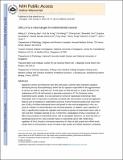| dc.contributor.author | Li, Ailing | en_US |
| dc.contributor.author | Jiao, Yisheng | en_US |
| dc.contributor.author | Yong, Kol Jia | en_US |
| dc.contributor.author | Wang, Fei | en_US |
| dc.contributor.author | Gao, Chong | en_US |
| dc.contributor.author | Yan, Benedict | en_US |
| dc.contributor.author | Srivastava, Supriya | en_US |
| dc.contributor.author | Lim, Gkeok Stzuan Diana | en_US |
| dc.contributor.author | Tang, Ping | en_US |
| dc.contributor.author | Yang, Henry | en_US |
| dc.contributor.author | Tenen, Daniel G | en_US |
| dc.contributor.author | Chai, Li | en_US |
| dc.date.accessioned | 2015-08-03T14:02:27Z | |
| dc.date.issued | 2014 | en_US |
| dc.identifier.citation | Li, A., Y. Jiao, K. J. Yong, F. Wang, C. Gao, B. Yan, S. Srivastava, et al. 2014. “SALL4 is a new target in endometrial cancer.” Oncogene 34 (1): 63-72. doi:10.1038/onc.2013.529. http://dx.doi.org/10.1038/onc.2013.529. | en |
| dc.identifier.issn | 0950-9232 | en |
| dc.identifier.uri | http://nrs.harvard.edu/urn-3:HUL.InstRepos:17820889 | |
| dc.description.abstract | Aggressive cancers and embryonic stem (ES) cells share a common gene expression signature. Identifying the key factors/pathway(s) within this ES signature responsible for the aggressiveness of cancers can lead to a potential cure. In this study, we find that SALL4, a gene involved in the maintenance of ES cell self-renewal, is aberrantly expressed in 47.7% of primary human endometrial cancer samples. It is not expressed in normal or hyperplastic endometrial. More importantly, SALL4 expression is positively correlated with worse patient survival and aggressive features such as metastasis in endometrial carcinoma. Further functional studies have shown that loss of SALL4 inhibits endometrial cancer cell growth in vitro and tumorigenicity in vivo, as a result of inhibition of cell proliferation and increased apoptosis. In addition, down-regulation of SALL4 significantly impedes the migration and invasion properties of endometrial cancer cells in vitro and their metastatic potential in vivo. Furthermore, manipulation of SALL4 expression can affect drug sensitivity of endometrial cancer cells to carboplatin. Moreover, we show that SALL4 specifically binds to the c-Myc promoter region in endometrial cancer cells. While down-regulation of SALL4 leads to a decreased expression of c-Myc at both protein and mRNA levels, ectopic SALL4 overexpression causes increased c-Myc protein and mRNA expression, indicating that c-Myc is one of the SALL4 downstream targets in endometrial tumorigenesis. In summary, we are the first to demonstrate that SALL4 plays functional role(s) in metastasis and drug resistance in aggressive endometrial cancer. As a consequence of its functional roles in cancer cell and absence in normal tissue, SALL4 is a potential novel therapeutic target for the high risk endometrial cancer patient population. | en |
| dc.language.iso | en_US | en |
| dc.relation.isversionof | doi:10.1038/onc.2013.529 | en |
| dc.relation.hasversion | http://www.ncbi.nlm.nih.gov/pmc/articles/PMC4059794/pdf/ | en |
| dash.license | LAA | en_US |
| dc.subject | Endometrial cancer | en |
| dc.subject | SALL4 | en |
| dc.subject | metastasis | en |
| dc.subject | chemoresistance | en |
| dc.title | SALL4 is a new target in endometrial cancer | en |
| dc.type | Journal Article | en_US |
| dc.description.version | Version of Record | en |
| dc.relation.journal | Oncogene | en |
| dash.depositing.author | Gao, Chong | en_US |
| dc.date.available | 2015-08-03T14:02:27Z | |
| dc.identifier.doi | 10.1038/onc.2013.529 | * |
| dash.authorsordered | false | |
| dash.contributor.affiliated | Chai, Li | |
| dash.contributor.affiliated | Gao, Chong | |
| dash.contributor.affiliated | Tenen, Daniel | |


